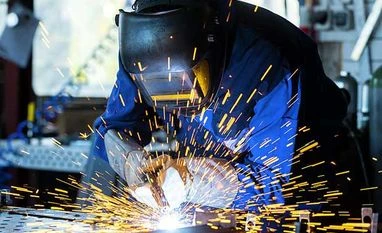As the National Democratic Alliance government turns three later this month, the goalposts seem to be fast shifting from just Make In India to also Buy In India. A mega policy is learnt to be in the works covering several key economic sectors, where domestic procurement should be given preference.
In fact, a source told Business Standard that the Prime Minister’s Office recently had a meeting on the contours of the proposed policy, which could be rolled out soon.
The sectors that the new policy could cover are likely to have names where the government is the largest consumer such as engineering, machinery and paper, among others, economists said.
Cement is another such sector but most of the consumption in the sector is from domestic manufacturing in any case.
The Union government has, in the recent past, come up with decisions for sectors such as petroleum and steel, highlighting preferential domestic procurement, but the new policy with the swadeshi focus is expected to be much larger in scope, a source aware of the development said.
This is coming at a time when many developed countries, including America and Australia, are on an economic nationalism spree. US President Donald Trump’s protectionist stance, especially related to H1B visa, for instance, has significantly hurt the information technology industry.
The government is perhaps planning to come up with a policy which has a thrust on local procurement, as it is keen to spread a feel-good factor, according to a bureaucrat who has been associated with key economic sectors. He added that “preferential domestic procurement has always been controversial and there’s a possibility of it getting challenged at the World Trade Organization (WTO)”.
More From This Section
However, Madan Sabnavis, chief economist, CARE Ratings, said there could be merit in such a policy, as the economic growth has been slow and the government has been the primary spender on infrastructure projects.
But Sabnavis cautioned that any preference for domestic procurement must be a short-term policy, ideally not more than a year. If it carries on, the country might lose out on cost advantage of buying the same products cheaper from other countries, he said. However, he pointed out that it would be interpreted as an “indirect protection” or “virtual protection” and therefore, may not be contested at the WTO.
Any policy on preferential domestic procurement could imply job creation, a priority area for the Narendra Modi government at this point. Despite signature schemes such as Make In India and Start Up India, job creation has remained a problem area for this government.
In fact, in a recent interview to this newspaper, the Minister of State for Commerce & Industry said that the government was planning to come out with a policy on Industrial Revolution 4.0 by September, marking the third anniversary of Make In India, to help companies manufacture in the country and create jobs. In the run-up to a comprehensive policy on preferential domestic procurement, the government has over the past two months announced some initiatives on those lines. Earlier this month, there was a policy on preference for sourcing of domestic iron and steel for infrastructure projects being built by state-owned companies, in a move aimed at shielding the sector from the onslaught of dumping of cheaper metals by countries such as China.
Also, the Ministry of Electronics & Information Technology announced a phased manufacturing programme to promote Make In India, but with a thrust on local sourcing.
In April, the Union Cabinet okayed purchase preference given to domestic manufacturers in procurements done by state-owned oil and gas companies. Before that, in March, the government announced a restructured general finance rules for public finance, including government procurement, to give first preference to locally manufactured goods.
Recent steps to promote local procurement
- MAY 2017: Policy on preference for sourcing of domestic iron and steel for infrastructure projects being built by state-owned companies
- MAY 2017: Phased manufacturing plan announced by Ministry of Electronics & Information Technology to promote Make In India, with a thrust on local sourcing
- APRIL 2017: Cabinet nod to purchase preference given to domestic manufacturers in procurements done by state-owned oil and gas firms
- MARCH 2017: General financial rules on public finance — including government procurement —restructured, to give first preference to locally manufactured goods
)